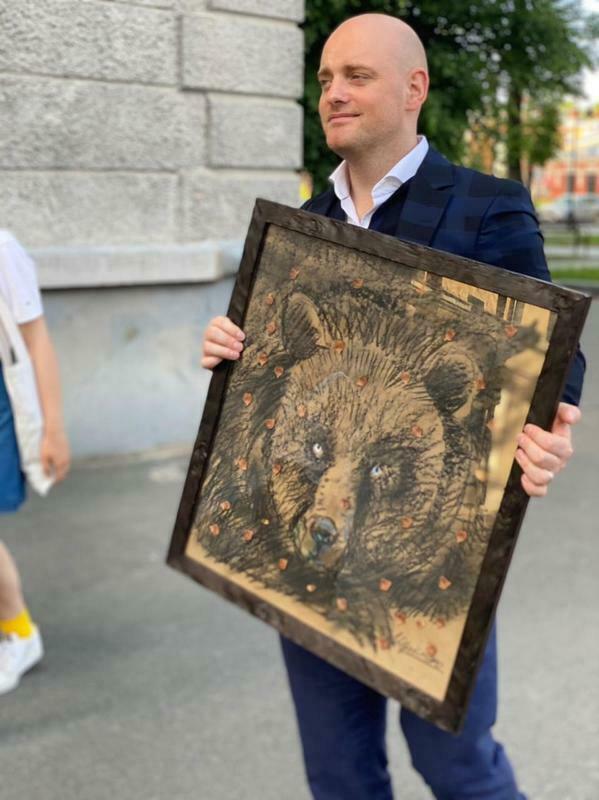
The blogger, writer, tutor, and possibly the most famous Russian-speaking Englishman on the Russian internet, Craig Ashton, explains the difference between British and Russian business people, how best to learn to draft a good email in English, and why it’s better to take language lessons from several different teachers at once.

What was your first encounter with the Russian business world and did the reality meet your expectations?
The first Russian businessman I met was the founder and owner of a chain of multi-brand luxury boutiques. I was expecting him to be a rather unforgiving, maybe even nefarious individual, a kind of Cruella de Vil, like in the Disney cartoon. You see, pretty much invariably in cinema, especially children’s cinema, rich people are portrayed this way and since I’d had no prior experience to go on, I naturally fell back on these stereotypes. So I prepared myself to meet a cold-blooded villain. However, my first Russian millionaire turned out to be a rather pleasant person, who despite his status and financial position, always treated me with respect.
Did you teach them to speak good English? What did they teach you?
They taught me to always strive for more. One of my millionaire-students wondered why I was poor. I just wasn’t trying; I didn’t want to get rich. At the time, I quite seriously supposed that all wealthy people were bad. This businessman understood my way of thinking and he began to teach me how to develop my teaching work. He took an interest in how many students I had, whether I could increase this number, and how I could raise the quality of my product. These thoughts hadn’t occurred to me before I met him. I used to just go to work, do it as well as I could, get paid and then walk out the door. He showed me how to systemise my teaching and scale up my business, to get a licence, hire other teachers etc. I didn’t open a school, but I promoted myself as an individual teacher and began to work more effectively.

Money changes people, as the saying goes. What impressed you, and what put you on guard when you were talking to Russian business people?
It does change some people, but not everyone. When I talked to rich Russians, what stood out for me was that they live more or less as they did before they had earned their millions. They’re not at all like the hackneyed, cartoon New Russians that you see on the BBC, with their yachts, ballerina girlfriends, gold and personal football teams. They eat ordinary food, for example egg and buckwheat or pike roe, which they buy from an ordinary corner shop down the road [Many Russian corner shops do indeed stock buckwheat and pike roe- translator’s note]. They wear cheap clothes. One of my students came to the office in a t-shirt and jeans and he only used to put on a suit for business meetings. I can’t recall a time when anyone treated me with disrespect or somehow tried to show to me that they were of a higher social status. This surprised me, as I was expecting to be patronised or looked down on as I was only a hired worker. The situation is similar for many working class people in England; we’re ready to serve. Russian business people never made me feel inferior, they never accepted a hierarchy. They treated me as an equal.
Are Russian business people different from their British counterparts?
Russians in general, and Russian business people in particular are quite definitely different from the British in their behaviour and the ways they interact with you. Sometimes Russian business people complain about their British counterparts when they negotiate with them. The vague blandishments of the English give them the impression that they’ll be signing a contract soon, when in fact the Brits aren’t even considering doing a deal. The Russians don’t pick up on negative signs when they’re couched in pleasant, seemingly constructive conversation.
In defence of my compatriots, I would say that there are certain social rules in Britain which foreigners may simply not know. Our way of doing business may seem hypocritical to some, but I wouldn’t say it was. The English find it rude to reject a proposal immediately, but their politeness is in no way a sign that they agree with your offer. We actually believe we are signalling a quite clear message, albeit in a code that may not be decipherable to all.
What’s the best way to learn to write to British colleagues and partners? Russians are used to getting straight down to business…what other rules are important to observe, apart from those of small talk?
I’ll give you the same advice as I give to my students. Choose some examples of correspondence from English people and analyse them. Don't pay attention to the elegant wording; work out their intentions. What did the author of this email want to say? For example, if someone hasn’t clearly indicated what they want, then the explanation for this could be one of several reasons; possibly they’re afraid of something or they don’t want to upset you, or they may be hiding some information because they don’t yet fully trust you. Examine the context from a psychological perspective.
If you have no examples of emails from your own correspondence, look for something similar on the internet. You can take a specialised business letter writing course, or do some reading. I recommend classic English authors who advise the British themselves on how to put together a business letter properly (for example, The Book of Letters by Peter Breen). When you are writing a letter yourself, try to concentrate on the meaning and keep in mind what exactly you want to communicate to the person you’re writing to. With this approach, even if your English isn’t ideal, you’ll be able to get across your intentions.
Recently I’ve noticed that Russians have started doing a warm up before their business discussion, a bit of small talk. Over tea they might discuss the beauty of Moscow. But for them the transition to important topics isn’t as smooth; three minutes and they get down to business.
To understand the English, you must know one of their peculiarities; they’re as skittish as squirrels. If you go up to a squirrel carefully and hold out some food for them they may come and take it, but if you run up to them too quickly the little beastie will be frightened and it’ll run away and hide. The squirrel is like the soul of an Englishman. You have to approach the British slowly, step by step; it’s not without reason that there is a saying in England; ‘Slowly, slowly catch a monkey’. I still put my guard up when I feel that someone has become overly familiar with me too soon, or if they suddenly jump into a serious conversation about money or business with no small talk or prior warning, even though I’ve been living in Russia for fifteen years now.
What do Russians have to know and understand about Britain before they open a business here?
The first thing they will encounter here is the mighty British bureaucratic system, which is very different to what they are used to in Russia. Everything is done strictly by the rules. Officials take their work very seriously. There is the concept of the ‘jobsworth’. This is a person who does everything meticulously by the regulations, sometimes relishing in their strict and maybe even malicious interpretation. You either have to learn how to deal with these people or hire a good lawyer (it’s my view that the second option is better). The next thing is to make sure that you keep that squirrel in mind; try to act according to tradition. You can’t break dance when the others around you are waltzing, even if you believe it to be the best dance in the world. If you do that you just won’t fit in. The English are very straightforward and predictable. If someone addresses me following the unwritten rules of social interaction here, I’m ready to do a lot to help them. But if the person ignores these rules, even if their English is impeccable, I’ll back away and put up my guard. It’s better to follow these unspoken by-laws, if only because doing otherwise is ineffective.

Is any native speaker a suitable English teacher for a Russian speaking professional with an intermediate level of the language? Or are there nuances to bear in mind?
It all depends on your aim; what do you need the language for? If you need to improve your conversational English and learn how to talk to the British, then it’s desirable to choose a teacher who is just starting out; a native speaker without any experience of talking to Russians, so that they don’t help you too much. By going through all the inevitable inconveniences and misunderstandings, you’ll get a grasp of the conversational norms. I used to help my students too much. I simplified situations, I made allowances for them being foreigners, and I didn’t let myself feel bothered by certain remarks or questions that seemed a little blunt or rude. When students say things like this, inexperienced native speaker teachers may sometimes get upset and say something heated in response, which is a natural reaction. This helps you to learn the cultural norms.
It may also be useful to have lessons with an English person who has had experience of talking to Russians. They understand the specifics of the two languages better. And you must have at least one lesson with a non-native, Russian-speaking teacher who has lived in England and ‘suffered’ at the hands of the English. A teacher like that will be able to tell you clearly what you can say and do when talking to the English, and what you mustn’t do.
The most effective way of all is to find a teacher with a profile in business teaching or who has had their own business in Britain. Someone like that already has knowledge and experience that ordinary native-speakers do not. Ideally, it’s worth choosing native-speaker teachers from different layers of English society; that way you’ll learn even more, you’ll find out about the class system and traditions. I believe that to get a full picture and really take your knowledge to the next level, you have to have lessons with different teachers.






